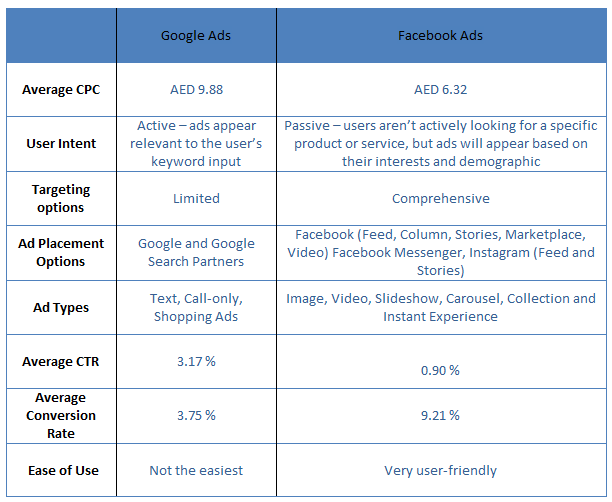Google Ads vs. Facebook Ads: Which is Better?
Which PPC channel should YOU invest in?
It’s well known that Facebook and Google’s advertising platforms are the two undisputed kings of pay-per-click (PPC) advertising. The question is: how do the two compare? For starters, they both operate in two different online realms, with one functioning on the world’s most popular social media platform and the other, on the world’s most popular search engine.
They’re both brilliant and their differences allow them to play to their strengths. but does one consistently provide a better ROI than the other? Let’s find out!
How do Facebook Ads Work?
Facebook ads are created in the user-friendly Facebook Ad Manager platform by selecting a budget, placement and run time for each advertisement.
The ad creation process is straightforward, with Facebook often being hailed as a user-friendly platform for advertisers. The Facebook Ads Manager allows users to craft highly specific ads and edit their settings, format, target audience, text and images.
A major advantage of Facebook Ads is the extensive targeting options. This feature allows Facebook to hold its own against the search engine behemoth despite a far, far smaller audience.
The ads are displayed to active Facebook users by a defined set of personal metrics related to demographics (age, gender and income), interests, behaviour and other Facebook engagement patterns. The ads are then shown to individuals who align with the chosen specifics.
The time it takes to convert is typically higher than Google, as Facebook users aren’t typically using the social platform with a customer’s mindset by actively looking for a product or service.
It’s important to note that this time isn’t wasted though, as brand interest and awareness can be effectively generated as a crucial supplement when conversions aren’t happening.
How do Google Ads Work?
Google Ads appear on a search engine results page (SERP) when the ads align with the specific keywords in a user’s search query. Creating the ads can only be done after the advertiser creates their own Google Ads account.
The ads are text-based with a title and meta description. In order for the ads to appear with the relevant search query, the advertiser has to include keywords within the copy.
The ads are created using the Google Ad Manager in your Google Ad account. This platform is notoriously tricky to use and may take a while to get familiar with if you’re a novice in this field. However, once you come to terms with the technicalities, creating your individual campaigns is relatively straightforward owing to the text-based nature of the advertising platform.
Unlike Facebook Ads, the ‘intent’ behind finding the ads is down to the individual via keywords. The purpose of a search engine, such as Google, is to give its users the opportunity to fulfil their search query, answering any question they might have.
This is why mastering the ad copy is a crucial part of the process. Fulfilling the search query with accurate and relevant copy is more likely to increase the CTR of the ad.
Comparison Breakdown:

Wrap Up
Verdict: Google
If you’re a new business with a decent-sized budget looking for a great ROI, a lead campaign with Google Ads has often proved to be the most effective option for your digital marketing efforts.
Google Ads require a larger advertising budget and experience – based on the difficulty it is to navigate their platform. Without stating the obvious, Google is a results-driven business that focuses on delivering consistent quality to its users. This is why a concrete knowledge of keyword input and research is also needed to get the best out of their platform.
If you can deliver quality in your ads, content, landing pages and website; from the copy, content, keyword use and other SEO ranking factors - the bidding cost for your ads will be lowered. That’s why, when it comes to Google Ads, working with an experienced digital agency is always recommended. Throwing a massive budget at your campaign will only get you so far if the quality is lacking.
Verdict: Facebook
If you really had to choose, Google would definitely be the recommended option for most businesses – but that shouldn’t mean Facebook Ads get left untouched in the corner. The opposite, in fact!
With regards to your social media marketing strategy, and your marketing strategy in general, Facebook Ads should always have a significant role to play. As they operate on the world’s most popular social network, their presence can have a positive impact on community-building, as well as assist you with the consolidation of crucial audience behaviour data and with the creation of your target audience profiles.
On paper, the average ROI for Facebook Ads may seem worse than their search engine counterparts, but word of mouth is an intangible and unquantifiable metric that can play a huge role in a business’s growth.
This is where advertising on Facebook has its advantages. Facebook can be a huge crowd-puller, especially after a viral marketing campaign gains traction. The potential is definitely there for this marketing channel to attract swathes of potential customers – even if you only end up building brand awareness.

